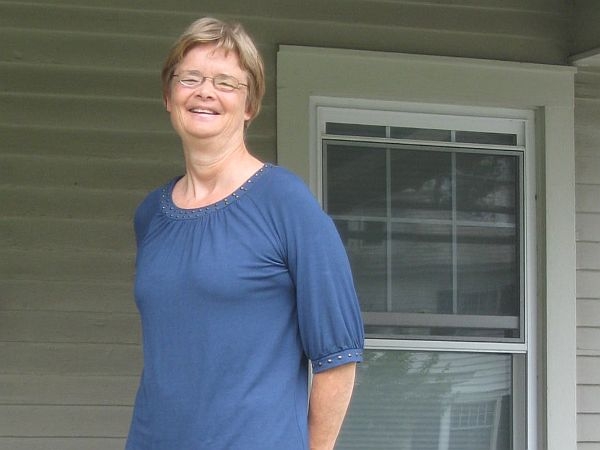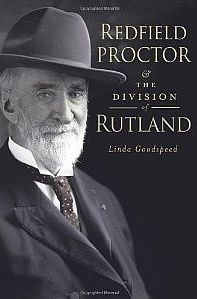 (Host) In 1880, Rutland was Vermont’s largest and most prosperous city. But a controversial political move in 1886 forever changed that.
(Host) In 1880, Rutland was Vermont’s largest and most prosperous city. But a controversial political move in 1886 forever changed that.
As VPR’s Nina Keck reports, a new novel delves into the events and the man behind the division of Rutland.
(Keck) Writer Linda Goodspeed grew up in Rutland, but says she knew very little about Redfield Proctor – the founder of the Vermont Marble Company.
(Goodspeed) "When I was working on this book people would ask what are you working on, and I would say something about Redfield Proctor and the responses would almost always be, oh, yes, he’s the one who divided Rutland."
(Keck) Goodspeed says she became interested in Proctor while doing research for a book on Pico Mountain, which Redfield Proctor had owned at one time. She soon found herself going through Proctor’s personal papers, state archives and old newspaper clippings.
(Goodspeed) "Redfield Proctor was a very extraordinary man. I was captivated by him.
(Keck) This summer, her book Redfield Proctor and the Division of Rutland was published by the History Press.
(Goodspeed) "I wrote it as a historical novel so it is a work of fiction based on the major events of Proctor’s life. But many of the words that come out of Proctor’s mouth are actually drawn right from his papers."
(Keck) Goodspeed says she kept to the facts, but took liberties with character development and some dialog. She says Redfield Proctor’s charisma, accomplishments and ruthlessness needed no embellishing.
(Goodspeed) "In 1869 he took over a bankrupt marble mill. He was 38 years old at the time. And within a very few short years he had turned that marble mill into the largest marble operation in the world. "
 (Keck) Proctor became one of the richest and most powerful men in Vermont, holding nearly every political office in the state, including Governor. Goodspeed says in the years after the Civil War, Vermont was staunchly republican. But the many ethnic marble workers in Rutland began to organize with other labor groups and they shocked many in Vermont when they elected a democrat to the statehouse.
(Keck) Proctor became one of the richest and most powerful men in Vermont, holding nearly every political office in the state, including Governor. Goodspeed says in the years after the Civil War, Vermont was staunchly republican. But the many ethnic marble workers in Rutland began to organize with other labor groups and they shocked many in Vermont when they elected a democrat to the statehouse.
(Goodspeed) "Proctor of course could not abide this. He also had his eye on the national election of 1888. I think he had his eye on national office. And so he really saw an opportunity to divide Rutland in 1886 and get it back into the Republican column."
(Keck) At the time, each Vermont town had one vote in the statehouse. Proctor pushed to have Rutland carved into three smaller towns. The newly proposed towns of Proctor and West Rutland contained Proctor’s Marble quarries, carving facilities and most of his employees. Vermont historian Don Wickman says that allowed Proctor to exert enormous control over how the towns voted.
(Wickman) "He would control by having company stores and company housing. So they were more or less subservient to him. I think the other catch is that those people – the ethnic groups and the laborer did not have a lot of clout in the town."
(Keck) And any clout they had begun to generate in the early 1880s was new and fragile. If Proctor got his way, one town’s democratic vote would be turned into two and possibly three republican votes.
(Goodspeed) "There was enormous opposition to this proposal."
(Goodspeed) "In her novel, Linda Goodspeed includes testimony from public meetings and labor groups, letters and editorials by the Rutland Herald condemning Proctor’s plan.
(Goodspeed) "And he just rammed it through. He did what he had to do to get it through the house and senate. He actually hired every lawyer in the county on retainer just to keep them away form the opposition."
(Keck) For Redfield Proctor and his fellow republicans the division was a success. The party gained two seats in Montpelier and Proctor went on to become Secretary of War and a U.S. Senator. Historian Don Wickman.
(Wickman) "I think it shows that local people did not have a lot of power at that time. Things were going to be debated up at the Statehouse. You can almost see the cigar smoking back rooms there. For Rutland I think it just changed the entire character of the community at that time. It lost probably some of its flavor back in 1886.
(Keck) Author Linda Goodspeed says Rutland lost a lot more than its flavor.
(Goodspeed) "All of the marble quarries were split off from Rutland so it’s tax base was diminished by about 4/5ths. We’ve never really recovered from this."
(Keck) Goodspeed and other historians says what’s ironic is that local citizens at the time had no say or vote on the matter. Redfield Proctor clearly benefited as did his family. Both Proctor’s sons and his grandson served as governor. Redfield Proctor died in 1908 at the age of 76.
For VPR News, I’m Nina Keck in Rutland.